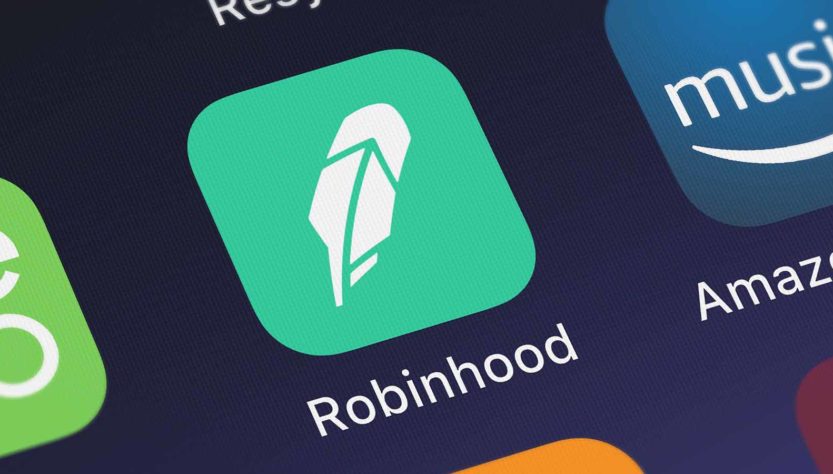Last week, Wall Street became the latest victim of its own making. As Archegos ’$ 30 billion hedge fund“ The liquidations rocked the stock markets, back-up banks asked how exactly a quiet family office managed to make them lose so much money.
Robinhood’s mobile app logo is displayed on a smartphone screen. Robinhood stocks
Retail investors should be even angrier. The episode exposed the warm relationship between the domed banks and the hedge fund bosses. Not only does Wall Street regularly turn a blind eye to the past misdeeds of these managers. (Archegos boss Bill Hwang pleaded guilty to insider trading in 2012). These banks actively help high net worth clients to become even richer at the expense of others. And although Robin Hood has begun to democratize parts of investing, they unwittingly unleashed the worst parts of Wall Street’s excesses without providing the solution.
As the Archegos saga continues to unfold, regular investors will learn how Robinhood has made the market-rigging even worse.
Investment banks: proof of a rigged market
Even before Archegos, investment banks have long enjoyed the benefits of an unequal market. Although “Chinese walls” are supposed to separate trade from corporate finance operations, studies have shown that banks often break these rules to gain an advantage over regular investors. (The researchers could also have visited a trading room and avoided conducting a study). Many of these major banks also oversee market making activities. Instead of paying commissions like regular investors, they receive income for the trades they do. It is a system that prioritizes Wall Street incumbents over foreigners. But then the SEC got in the way. In 2015, the Volcker Rule – part of the Dodd-Frank Wall Street reforms – made it much more difficult for investment banks to trade their own money. So, these banks turned to the next best thing: making money from other people’s exchanges.
Archegos and hedge funds: the cash cow of investment banks
Since the adoption of the Volcker rule, banks have increasingly relied on hedge funds and family offices like Archegos. With the right relationships, these wealthy people could borrow huge sums of money from investment banks to make outsized bets in the market.
Sometimes those bets were fueled by insider knowledge, as highlighted by the SEC’s lawsuits against Galleon Group Raj Rajaratnam and SAC Capital’s Stephen Cohen. But generally, these bets take place in the shadows, with banks extending cheap credit to hedge funds in exchange for large trading margins. As long as everyone was making money, the banks had little reason to object. By 2020, companies like Credit Suisse generated almost 30% of their sales from transaction-based revenue, up from 20% in 2015.
Bill Hwang’s Archegos Capital took these warm relationships a step further.
“For some time after the SEC affair, Goldman refused to do business with him for compliance reasons,” Fortune reporters wrote. “But [Goldman] gave in as his rivals took advantage of his needs being met.
Companies like Mr. Hwang’s generated so many commissions through indirect swaps (known as contracts for difference) that banks largely ignored the absurd risk-taking that was going on under their noses. It wasn’t until last week that these financial firms realized that Archegos only has about $ 10 billion in equity for $ 50 billion in stocks – several billion dollars less than margin requirements. minimum imposed by FINRA.
That’s why Archegos’s 25% drop in holdings last week didn’t just hurt. In four short days, the losses generated by leverage destroyed the entire capital cushion of the company plus an additional $ 6 billion in bank capital (that is, money from public shareholders).
Robinhood opens the wrong door
Regular investors began to get a taste of this nonsense. In 2018, Robinhood released commission-free options trading, giving ordinary investors a way to bet large sums of money with almost no upfront equity. And just like dynamite fishing, many young investors have accidentally blown up their ships.
In June of last year, Alex Kearns, a Robinhood trader, committed suicide after believing he owed nearly $ 750,000 in stock market losses. The 20-year-old had no experience in options trading and had only $ 5,000 in savings for life. But that didn’t stop Robinhood from allowing Mr. Kearns to trade high-risk options contracts with virtually unlimited downside. Her parents have since filed a wrongful death lawsuit.
That hasn’t stopped thousands of other retail investors from taking Kearns’s place; Reddit’s r / WallStreetBets lists countless articles of equally devastating losses.
The problem comes down to high fees – a hurdle even hedge funds face. Financial derivatives like options all have price structures that compare to retail investors. No matter how many winners you have, the nature of zero-sum products means that the average options trader will always lose money in the long run. What about Robinhood’s so-called “zero commission” structure? App-based brokerage simply converts the commission into higher premiums, much like the way investment banks profit from hedge funds.
Even Robinhood’s fractional actions started to resemble Archegos’s contract-for-difference agreements a bit. Instead of outright owning shares, Robinhood fractional shareholders now buy derivatives from brokers for even higher trading fees.
The missing factor: sell-side research
2107 / 5000
Translation results
These unfair advantages persist because Robinhood has failed to democratize even more critical part of Wall Street: the information that drives investment decisions. These include:
Detailed research reports, real-time trading alerts and dedicated account managers that help high net worth clients navigate the markets.
From an investor’s perspective, these “selling” actors are worth their weight in gold (no matter what the skeptics say). The best investment analysts regularly demonstrate better knowledge of the companies they cover, and many of these analysts often correctly predict company profits down to a dime. While not perfect, these professional analysts have the time and resources that no armchair investor could hope to replicate.
Hedge funds benefited greatly, systematically outperforming the market excluding fees.
Meanwhile, regular investors are watching YouTube videos and Discord chats on the next hot title. Often, much of the news favors staging over substance – “I like the headline” has become the de facto rallying cry of buyers. Other times, these online sleuths are correct, but their findings are immediately exchanged by the companies at high frequency before regular investors can act.
This means that as a group, the performance of retail investors is very similar to that of hedge funds in reverse.
Robinhood inadvertently worsened these inequalities. Its newsletter, Robinhood Snacks, provides only superficial information on stock trends. And former employees describe Robinhood’s customer support initiatives as “an ineffective support model: customer service agents with no qualifications to offer financial advice, licensed brokers too busy to help, and customer calls. which remained unanswered. ”
The legacy of Archegos
Investment banks will undoubtedly learn the wrong lessons from the Archegos fiasco. For them, it’s more important that Goldman Sachs and Morgan Stanley avoided significant losses by liquidating nearly $ 20 billion in bulk sales. The harsh impact on the market on Friday does not matter, as do the losses suffered by regular investors. Former Archegos Discovery (NASDAQ: DISQUE) and CBS / Viacom (NASDAQ: VIAC) operations are still down more than 40% and 52%, respectively, since the liquidation began on March 22.
Meanwhile, Robinhood will continue as if nothing has happened. Margin and option accounts are lucrative income generators, and Robinhood has every short-term incentive to keep investors running their accounts.
All is not lost – there are plenty of high quality analysts offering their advice online. Many of them consistently outperform their peers on the selling side.
But until Robinhood levels the information playing field, investors need to be cautious. As the Archegos saga points out, mixing high leverage with bold trading works well until it doesn’t. After all, what better way to catch a lot of fish than with a high-quality stick of dynamite?
As of the publication date, Tom Yeung does not hold (neither directly nor indirectly) any position in the securities mentioned in this article.
Tom Yeung, CFA, is a registered investment advisor whose mission is to bring simplicity to the world of investing.

